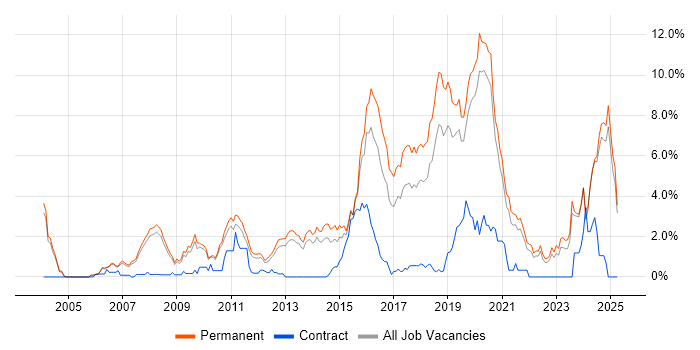Algorithms
Oxfordshire > Oxford
The table below looks at the prevalence of the term Algorithms in permanent job vacancies in Oxford. Included is a benchmarking guide to the salaries offered in vacancies that cited Algorithms over the 6 months leading up to 3 May 2025, comparing them to the same period in the previous two years.
| 6 months to 3 May 2025 |
Same period 2024 | Same period 2023 | |
|---|---|---|---|
| Rank | 23 | 15 | 42 |
| Rank change year-on-year | -8 | +27 | +13 |
| Permanent jobs citing Algorithms | 17 | 57 | 9 |
| As % of all permanent jobs advertised in Oxford | 7.17% | 8.74% | 1.91% |
| As % of the Miscellaneous category | 16.50% | 20.14% | 4.66% |
| Number of salaries quoted | 11 | 54 | 9 |
| 10th Percentile | - | - | - |
| 25th Percentile | £43,750 | £41,250 | £32,500 |
| Median annual salary (50th Percentile) | £47,500 | £62,500 | £72,500 |
| Median % change year-on-year | -24.00% | -13.79% | +20.83% |
| 75th Percentile | £65,625 | £72,500 | £85,000 |
| 90th Percentile | £66,250 | £73,750 | - |
| Oxfordshire median annual salary | £55,000 | £62,500 | £45,000 |
| % change year-on-year | -12.00% | +38.89% | -55.00% |
All Generic Skills
Oxford
Algorithms falls under the General and Transferable Skills category. For comparison with the information above, the following table provides summary statistics for all permanent job vacancies requiring generic IT skills in Oxford.
| Permanent vacancies with a requirement for generic IT skills | 103 | 283 | 193 |
| As % of all permanent jobs advertised in Oxford | 43.46% | 43.40% | 40.89% |
| Number of salaries quoted | 50 | 182 | 112 |
| 10th Percentile | £43,750 | £31,250 | £26,750 |
| 25th Percentile | £52,750 | £40,906 | £40,938 |
| Median annual salary (50th Percentile) | £60,000 | £52,500 | £55,666 |
| Median % change year-on-year | +14.29% | -5.69% | -10.93% |
| 75th Percentile | £76,875 | £64,500 | £72,813 |
| 90th Percentile | £95,125 | £73,750 | £86,125 |
| Oxfordshire median annual salary | £52,609 | £47,500 | £49,250 |
| % change year-on-year | +10.76% | -3.55% | -9.22% |
Algorithms
Job Vacancy Trend in Oxford
Job postings citing Algorithms as a proportion of all IT jobs advertised in Oxford.

Algorithms
Salary Trend in Oxford
3-month moving average salary quoted in jobs citing Algorithms in Oxford.
Algorithms
Salary Histogram in Oxford
Salary distribution for jobs citing Algorithms in Oxford over the 6 months to 3 May 2025.
Algorithms
Co-occurring Skills and Capabilities in Oxford by Category
The follow tables expand on the table above by listing co-occurrences grouped by category. The same employment type, locality and period is covered with up to 20 co-occurrences shown in each of the following categories:
